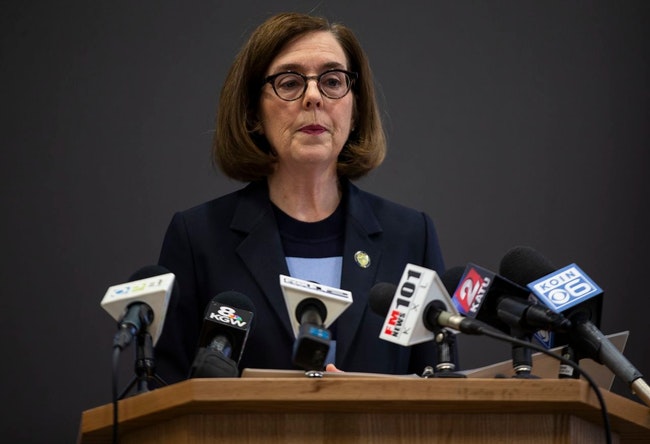 Oregon governor Kate Brown speaks at a press conference the afternoon of March 16, 2020. Dave Killen / staff, the Oregonian
Oregon governor Kate Brown speaks at a press conference the afternoon of March 16, 2020. Dave Killen / staff, the Oregonian
Coronavirus resources: CDC on the coronavirus, Oregon Health Authority resources, Washington County resources, Oregonian reporting on the coronavirus, OPB glossary of coronavirus terms, NYTimes free reporting on the coronavirus.
This article was originally published by the Oregonian/OregonLive, one of more than a dozen news organizations throughout the state sharing their coverage of the novel coronavirus outbreak to help inform Oregonians about this evolving health issue.
In a late Monday night ruling, the Oregon Supreme Court stepped in to put a hold on a dramatic decision by an eastern Oregon judge that declared not only Gov. Kate Brown’s restrictions on church gatherings but all her “Stay Home Save Lives’’ coronavirus emergency orders “null and void.’’
State Supreme Court Presiding Thomas A. Balmer, in a three-paragraph ruling issued at 7:45 pm., granted the state’s emergency motion after reviewing briefs from both sides. The emergency hold will remain in effect until the state’s high court considers the state’s full petition to dismiss the Baker County Circuit judge’s preliminary injunction. Balmer gave the plaintiffs until Friday to file any responses and said the court would take the matter under advisement, with no set timetable for a decision.
“This court understands that the current pandemic creates an unprecedented crisis in the state as well as in our country,” Shirtcliff said, speaking from the bench in a videoconference hearing.
He said he must weigh the governor’s public health concerns against the constitutional right of freedom of worship, but he found that “the balance of equities tips in favor of Plaintiffs.”
Salem-based attorney Ray D. Hacke filed the lawsuit earlier this month on behalf of the nonprofit group Pacific Justice Institute, which takes on religious liberty cases, 10 churches from across the state and 21 individuals. The churches, led by Elkhorn Baptist Church in Baker City, are in Bend, Camas Valley, Klamath Falls, Lincoln City, Newberg, Portland, Roseburg and Salem.
Hacke said Monday night that he was dismayed that the state Supreme Court is standing in the way of the injunction.
“I’m discouraged the Supreme Court decided to reverse that. I think it defeats the whole point of the injunction but that’s the call,” he said.
Document: Judge’s Ruling
Document: Judge’s formal order granting preliminary injunction
Baker County Circuit Judge Matthew B. Shirtcliff had ruled about 11:30 a.m. that the governor’s executive orders in response to the global pandemic exceeded a 28-day limit adopted by state lawmakers and were no longer valid, in response to a suit filed by 10 churches against the governor.
Less than three hours later, the governor’s office appealed to the state Supreme Court to keep her emergency orders in effect, arguing that Shirtcliff overstepped his authority and his legal reasoning was flawed.
“Following swift action by the Oregon Supreme Court, my emergency orders to protect the health and safety of Oregonians will remain in effect statewide while the court hears arguments in this lawsuit,” the governor said in a statement after the state’s high court ruled. ”From the beginning of this crisis, I have worked within my authority, using science and data as my guide, heeding the advice of medical experts… There are no shortcuts for us to return to life as it was before this pandemic. Moving too quickly could return Oregon to the early days of this crisis, when we braced ourselves for hospitals to be overfilled and ventilators in short supply.”
Shirtcliff granted a preliminary injunction to 10 churches that had sued the governor, finding they had shown “irreparable harm” from the deprivation of the right to freely exercise their religions.
“The governor’s orders are not required for public safety when plaintiffs can continue to utilize social distancing and safety protocols at larger gatherings involving spiritual worship,” he ruled.
He noted: “Plaintiffs have shown that they will be harmed by deprivation of the constitutional right to freely exercise their religion. Other plaintiffs have also shown great economic harm to their businesses and their ability to seek livelihood.”
The Baker County judge found that the churches can take necessary social distancing precautions, just as grocery stores and other essential businesses have done. He also ruled that the injunction was in the public’s interest, allowing people the right to freely worship and the ability to restore economic viability.
Documents: State’s emergency motion for a stay, state’s petition for writ of mandamus , memo in support
Before the Baker County judge, attorneys for the churches successfully argued that ORS 433.441 limits declared public health emergencies to 14 days, or up to 28 days maximum, and because COVID-19 is a public health crisis, that limitation applied.
But the governor’s attorney countered that Brown declared a state of emergency under a different state law, ORS 401.165, which isn’t limited to any particular time period and continues indefinitely.
Yet Shirtcliff found that the governor’s other “Stay Home Save Lives” executive orders placing limits on social gatherings, education and businesses also were void because they exceeded a 28-day limit.
“Moreover, by not complying with ORS 433.441(5) timelines, the Governor’s subsequent Executive Orders 20—05 through 20-25 are also null and void,” the Baker County judge wrote.
Attorney Marc Abrams, representing the governor, urged Shirtcliff to put a hold on his ruling until the Oregon Supreme Court could review it. The governor will cite the importance of Brown’s emergency restrictions on social gatherings due to the ”loss of life, spread of the disease,” Abrams said. He also noted that most states in the United States have taken actions similar to that of Brown.
“There’s evidence that this is working and the hardship balance calls at least for the court to stay its order to allow for legal review and in the interest of maintaining the status quo,” he argued.
But Shirtcliff, the former Baker County district attorney who was appointed to his judge’s seat last year by Gov. Brown, denied the hold request.
Within hours of the ruling, Attorney General Ellen Rosenblum urged Oregon residents to continue to comply with the governor’s emergency orders “to protect all of us.’’
By 2:30 p.m., Rosenblum’s office had drafted a petition to the state Supreme Court to throw out the preliminary injunction, arguing that if allowed to stand, it “sharply increases the risk that Oregonians will be exposed to and contract COVID-19.” The office also asked the state’s high court for an immediate hold on the Baker County judge’s injunction.
The trial court exceeded its discretion and committed “fundamental legal error,” because the argument that the governor lacks authority to address the coronavirus emergency “lacks merit,” Solicitor General Benjamin Gutman wrote. He noted that the state constitution grants the governor “all the police power vested in the state.”
Any time limits to the provisions for public health emergencies in state law “supplement rather than supplant” the governor’s unlimited powers under her declaration of a state of emergency, he wrote. He further argued that the public interest overwhelmingly weighs against disturbing the governor’s executive orders.
Because the injunction creates “undisputed dangers,” Gutman urged the state’s high court to exercise its authority and “protect the public health and allow the Governor to oversee an orderly transition from the Stay Home, Stay Safe executive order to less restrictive conditions.”
Earlier this month, Hacke told The Oregonian/OregonLive, “If we’re risking our lives to go to church, if we survive great. If we die, then we’re going to heaven. If we want to take that risk, then it’s on us.”
In a court filing, Abrams took issue with Hacke’s quote. “But when behavior endangers others, it is not just a matter of individual choice and is, instead, a threat to public health,” he wrote.
Brown earlier this month had modified her executive order, allowing social gatherings of up to 25 people with social distancing for counties with state-approved reopening plans. The governor’s office urged the suit be dismissed, arguing that public health is paramount.
“The Executive Orders issued by Governor Brown are not designed to hinder any specific faith, not designed to impede worship any more than any other activity that, by the mere act of gathering in large numbers, puts lives at risk. They are designed to keep Oregonians alive and to stop the spread of COVID-19,” Abrams argued in court filings.
Conservative activist Kevin Mannix, former legislator and gubernatorial candidate, was allowed to intervene in support of the churches’ suit against the governor on behalf of the nonprofit group Common Sense Oregon.
Later Monday, public health experts in the state held a news conference urging residents to maintain their social distancing, wear masks and wash hands, no matter what happens with the legal skirmish. They emphasized the need for a phased reopening of the state.
“I’m very concerned it sends the wrong signal,” Dr. Bruce Goldberg, professor in the OHSU-PSU School of Public Health, said of the Baker County judge’s ruling. “If we do abandon the social distancing in a random and uncontrolled way, we’ll certainly put more of us at risk.”
The Rev. Chuck Currie of the United Church of Christ who also is assistant professor of religious studies at Pacific University, blasted the judge’s ruling.
“People of faith want to worship. We want to gather. But houses of worship across the world have ended up as hotspots for #COVID19. This decision by Circuit Judge Matthew Shirtcliff is reckless,” he wrote in a Twitter message after the ruling.
Hacke said he was scrambling with Mannix to respond to the state’s petition for state Supreme Court review, although he said it wasn’t unexpected. He said the suit he filed on behalf of the churches and others sought to limit the governor’s orders beyond those impacting religious gatherings. “She already exercised broad powers. We saw fit to exercise our rights to seek a broad remedy,” he said.
Some Republican leaders applauded the decision.
“We welcome the decision by the Baker County Circuit Court to respect the fundamental rights of the people of Oregon and to restore the rule of law,” said Oregon Republican Party Chairman Bill Currier. “It serves as a powerful reminder that Governor Brown, whatever her intentions, is not a ruler who can ignore Oregon’s Constitution and laws.”
Senate Republican Deputy Leader Dennis Linthicum of Klamath Falls said he was “thrilled by this significant challenge to our government’s overreach. … Churches, businesses and families have suffered under Governor Brown’s unconstitutional executive orders, and their lives have been irreparably damaged by the Governor’s actions.”
In a similar case brought in California, a federal judge ruled this month that state and local stay-at-home orders were a valid exercise of emergency police powers and didn’t violate a church’s constitutional rights. The judge in that case noted that the U.S. Supreme Court more than 100 years ago upheld the government’s right to exercise police powers to promote public safety during a public health crisis.
Yet last week, the Wisconsin Supreme Court struck down Gov. Tony Evers’ stay-at-home order, ruling that his administration overstepped its authority when it extended the order for another month without consulting legislators.




